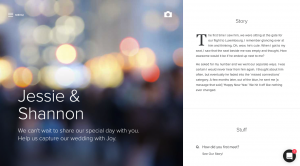Last Updated on December 22, 2023 by Joy Editors
Planning a wedding can be a daunting task. It can seem like there are so many things to consider, so many things you “have to have.” It can be difficult to know where to even start. All of the little (and not so little) details of wedding planning can make it easy to lose sight of the big picture.
So how can you make sense of it all?
The important thing is to start with the essentials and work from there. And the most essential thing is that you’re getting together with family and friends to make memories and celebrate this new stage in your lives. From there, your wedding planning possibilities are virtually endless, and how you plan the big event is ultimately up to you.
Regardless of whether you want a small ceremony with close family and friends in a non-traditional setting, a joyous community gathering, or an exciting weekend getaway far from home, this guide can help you make the most of the time you spend planning it all out.
Where to Start With Wedding Planning
When it’s time to start planning your wedding, the first step is to stop and think about what matters to you. Start by sitting down with your partner to decide what the two of you want.
Bringing in parents or other close family members should come soon after. If the wedding will be funded in great part by family members, then they certainly might expect to have some input.
When discussing your wedding with your partner and your family, you may want to remember the following points:
- Focus first on the big picture issues first—budget, guests, location.
- Save secondary concerns for after the big decisions have been made.
- What are some traditional aspects of weddings that you definitely want to have?
- What are some non-traditional, unique features you might want to include?
- What’s not as important: What aspects of the wedding might you be willing to give up if necessary?
Budget First vs. Guests First
There are at least two schools of thought that you are likely to encounter when seeking advice on what to plan first.
The traditional advice is to figure out a budget, and see how many guests you can afford to have given how much you want to spend on food and drink. Then you may have to make tough decisions about whom to invite if the number of guests is limited.
Another equally sound decision is to have a general idea of you guest list before going into detail on your budget. It can be much easier to figure out how much you want to spend on food or the bar if you already know how many people you really want to be at your wedding. This may make more sense for you than starting with an abstract number and then having to spend lots of time struggling with the question of who gets to be one of the lucky few. And you can use the guest list management tool that is built into Joy to add your guests and get your counts for budget calculations. It will store all of your guests’ information in a single place, like a spreadsheet, and you can use it later for sending out save-the-dates and RSVPs.
If the most important things to you are location (as in a destination wedding, for instance) and you’re planning on a small, intimate wedding anyway, you may feel sure you won’t have any regrets when it comes to your guest list. In that case, perhaps starting with some serious budgeting is the right decision for you.
Whether your wedding planning with your budget or you guest list, remember to not lose sight of the big picture. If you decided having your loved ones near for this occasion is a top priority for you, make your budget adapt to that and not vice versa.
Traditional, Unique, or Both?
Whatever “tradition” means to you and your family, you may be faced with the question of how much you want to adhere to it.
Both traditional and non-traditional weddings have their advantages and drawbacks. Some quick considerations:
- Choosing to have your wedding in a traditional venue with a traditional ceremony, reception, and catering could limit the options you have for personalization.
- Non-traditional wedding venues may have a lower cost up front, but the cost of catering and rentals can quickly add up.
- DIY can be an option for catering, decorating, and other aspects of the wedding, but be realistic about the time you are willing or able to put into it.
Again, your decision about what aspects to include and how traditional or unique you want your wedding to be should fit with the big picture you decided on.
If you do decide to do things your own way, just make sure to let guests know what to expect well before the big day.
Making Memories
So many of the things that go into planning a wedding are so important, yet in the end they may not be the things you or your guests remember the most.
So what will your guests remember?
Well, what do you want them to remember?
Ideally you want them to have fun and remember a joyous occasion centered around the two of you. Your guests will likely remember the general atmosphere way more than the appetizers or the decorations (not that you shouldn’t spend time and effort on those things if they are important to you!) And if your guests are having fun, it’s all the more likely that both their memories of the event and yours will be overwhelmingly positive.
As is so often the case in life, the big, important things aren’t necessarily the tangible things. So in the process of wedding planning, make sure to start cultivating great memories early on. You can involve all of your loved ones in the process! Encourage those involved to take photos of all the moments behind-the-scenes. Photo collection apps like Joy make it easy for everyone to share and view within a private event.
Whatever “big picture” wedding decisions you make now, it’s important to keep them in mind as you plan out out the details of the event. Photo albums, a wedding website, and writing out the story of your relationship can be great reminders of what’s important. Free wedding tools like Joy can help you get started with these and other essentials to start creating the atmosphere you want right away!
Get Started – Write a Wedding StoryA wedding website can help you express what your wedding is all about and inform guest of the important details all in the same place.
|




